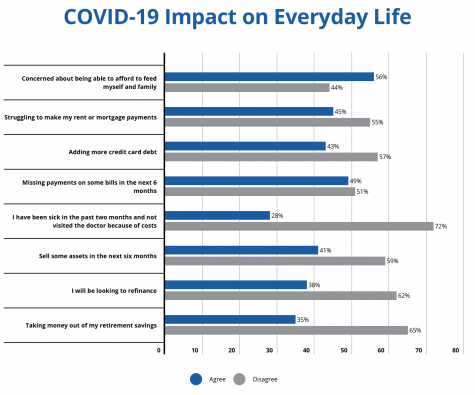The Voices of the Valuable: The Financial Impact of Covid-19

Taylor and her grandparents, Dianne and Leslie LeBlanc. Courtesy of Taylor Thompson ’20
May 18, 2020
As Dianne and Leslie LeBlanc, husband and wife of fifty-two years, sit at their kitchen table in the suburban neighborhood of Danvers, Massachusetts, they share a glassy look of concern, as they struggle to fathom the change that has dilapidated their lifestyle, that being the financial implications of Covid-19.
As Leslie works on a check by check basis, serving as a self-employed carpenter, he worries for him and his wife, as mortgage, food, taxes, and other necessary payments plague him with trepidation. Leslie files for unemployment, but he fears that it will not be enough.
Dianne and Leslie are my grandparents, and their current day-to-day plight can be seen in several American households, as citizens across the country are struggling to financially stay afloat in these unprecedented times.
On a global scale, the coronavirus pandemic has afflicted citizens in 185 countries, killing hundreds of thousands of people, and slashing economies worldwide. As workers have gone home to protect themselves from the disease, following the stay-at-home orders, the economies have taken a turn, as the stock market has plummeted; dow jones industrial average has seen the biggest quarterly drop in the first three months of the year since 1987; central banks in many countries have slashed interest rates; travel rates are the lowest due to travel bans; and sundry countries are expected to enter recession.
That said, the number of citizens filing for unemployment has reached a record high, as over 30 million have filed in the United States from mid-March to May.
More than 4 in 10 Americans, who are now unemployed due to the pandemic, are unable to pay rent, mortgage, or bills for utility, have taken a pass on medical care, and are going hungry.

In efforts to aid those financially struggling, Congress recently passed a $2 trillion relief package, under the CARES Act, which augments unemployment benefits and provides Americans (mostly those in big cities) with one-time cash assistance (for those making $75,000 or less per year comes out to $1,200). Despite this seemingly beneficial effort, of the 67% of Americans who anticipate receiving these benefits, 17% do not know if they are eligible, and 31% plea that this will merely last a month…and of the 31%, 8% state that it won’t help them at all.
One of the most pressing issues for Americans is housing, as unemployment benefits, especially under the CARES Act, will not financially suffice. ⅓ of Americans were not able to pay rent in April, and those evicted from their homes are in more danger than ever, as they cannot simply spend the night with friends or older relatives, due to social distancing measures; hence, they are left on the streets. While many states have implemented temporary eviction moratoriums, restricting landlords from removing people from their homes during this time, this measure is not seen in all states, as citizens like Dianne and Leslie still must pay their mortgages or rent.
In addition to housing, many Americans have had to significantly cut spending, as 31% of people nationwide have had to lessen their food supply and 28% have had to open savings or credit card debt to pay for weekly and monthly bills.
Medical care has also served as a huge issue, as medical bills, especially in these times, are too costly for most Americans. Although some private health insurance companies have taken the initiative to lower costs, most health care providers have not, leaving low-income families in danger. To put things into perspective, as of 2018, approximately 28 million Americans, excluding senior citizens, were uninsured. For an uninsured patient, the cost to be tested for Covid-19 is $500 at a doctor’s office and around $1,000 in a hospital. With Americans struggling to pay for rent, utility bills, mortgages, taxes, and food for their families, they will not be using the $1,200 (or less) from the CARES Act to take a test. Not only that, but if the patient tests positive and needs hospitalization, medical deductibles can come out to around $2,000, while patients who do require hospitalization might have to pay between $75,000-$100,000 for 10 days of care. Where is this money coming from?
Additionally, according to many sources, the most at risk for financial troubles are young workers, low-income workers, and women. 17% of women work in retail and hospitality jobs, all that have been shut down, while men only comprise 13% of work in these “shutdown sectors.” Those who have also just graduated college and need to repay student debts and loans are financially suffering, as they are also out of work.
Not only have these fiscal issues taken a toll on people’s physical lifestyles, they have affected millions psychologically. According to several sources, 18% of US adults have experienced a physical reaction to the distress, whether that be through anxiety attacks or depressive episodes. ⅓ of Americans between 18 and 29 are considered to be in the high distress group, along with women and lower-income workers in the same age range.
The economy is plummeting. Americans are struggling. And as each day in quarantine passes by, it is important, amidst our seemingly endless boredom, to step outside of ourselves and to think about our world and our country. We must place ourselves at the kitchen table with citizens like Dianne and Leslie, and hear their plight, and fight for change. Because these are the voices of the valuable. And they need help.


